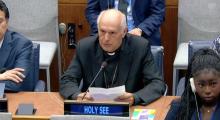Issued by the Catholic Center for Studies and Media - Jordan. Editor-in-chief Fr. Rif'at Bader - موقع أبونا abouna.org

Churches in Britain are experiencing a ‘Quiet Revival’, according to new research by the Bible Society.
New data reverses held beliefs that Christianity is declining in Britain. Instead, engagement with church is increasing, particularly amongst Gen Z.
Over 13,000 people were surveyed on church involvement. Data was compared to a near-identical study of a similar sample group in 2018.
Across all age groups, church attendance increased 56 per cent between 2018 and 2024. Most notably, attendance among Gen Z (ages 18-24) has quadrupled, from 4 per cent to 16 per cent.
Under the previous survey, the largest churchgoing demographic was the over-65s. Now, a similar number of young adults are attending church, as pensioners were in 2018.
The report identifies both a greater openness to faith and spirituality, and to churchgoing in general, even among non-churchgoers. Younger people are particularly warm to spirituality, with 40 per cent of 18–24-year-olds saying they pray at least monthly and 51 per cent saying they’ve undertaken a spiritual practice in the last six months – the highest of any age group. Among non-churchgoing 18-24-year-olds, curiosity about Christianity is also higher than average, with 34 per cent saying they would attend church if invited by a friend or family member and a quarter (25 per cent) saying they would be interested in discovering more about the Bible.
Whilst recent years have seen male influencers promote traditional values as a form of masculinity, Dr Rob Barward- Symmons, Senior Research and Impact Manager at the Bible Society, tells Premier the increase in young men in church is more organic.
“These trends that we're seeing amongst young adults, of feeling lost, anxious, and isolated, for some, is leading them to these quite harmful, toxic spaces that we've heard a lot about.
“But this research shows that [young people] are seeking that meaning and that healing. They’re finding community in the church, and that’s really drawing them there.”
One explanation for the increase in churchgoing could be an increasingly ethnically diverse UK population, with Christianity a strongly held religion for many migrants. Yet the data indicates that faith is growing across a range of social cross-sections.
Director of Research at the Bible Society, Dr Rhiannon McAleer, told Premier: “The stereotype is that churchgoers are predominantly old, white and female. Increasingly, that is no longer the case. We’re seeing increasing ethnic diversity, but also large numbers of younger people from all ethnicities.”
Across all age groups, the mental and social benefits of church attendance were recorded. Over 60 per cent of Christians who are part of a church say they feel a sense of belonging in their local community. For non-churchgoers, this drops to 25 per cent.
Rather than a decline in Christianity, researchers say the true decline is in nominal Christianity – whereby people attach the label of ‘Christian’ to themselves as a social norm, but rarely participate in day-to-day mission.
“People who identify as Christians are much more likely now to be active in their faith,” said Dr. Barward-Symmons. “That's not just going to church, that's praying, reading the Bible, and believing in an active, interventionist God who cares about their life.”







